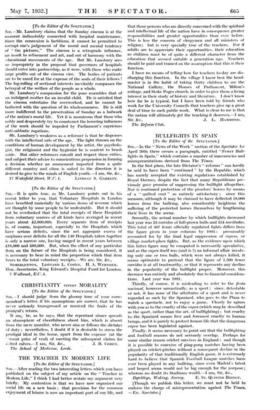THE TEACHER IN MODERN LIFE
[To the Editor of the SPECTATOR.]
Sni,—After reading the two interesting letters which you have published on the subject of my article on the " Teacher in Modern Life," I think I had better restate my argument very briefly. My contention is that we have now organized our social life on a new basis ; that provision for the common enjoyment of leisure is now an important part of our life, and
that those persons Wil0 are directly concernedwith the spiritual and intellectual life of the nation have in consequence greater responsibilities and greater opportunities than ever before. This is less the concern of clergymen and all ministers of religion; but is very specially true of the teachers. For it adults arc to appreciate their opportunities, their education as children must be of quite a different character from the education that seemed suitable a generation ago. Teachers should be paid and trained on the assumption that this is their function.
I have no means of telling how far teachers to-day am dis- charging this function. In the village I know best the head- master is in the habit of taking thirty children to see the National Gallery, the Houses of Parliament, Milton's cottage, and Stoke Poges church, in order to give them a living interest in their study of history and literature. I don't know how far he is typical, but I have been told by friends who work for the University Councils that teachers give up a great deal of time to such public work. What is clear to me is that the nation will ultimately-get the teaching it deserves.—I am,






































 Previous page
Previous page